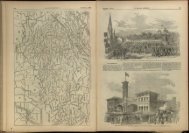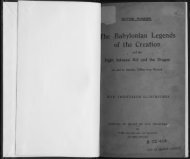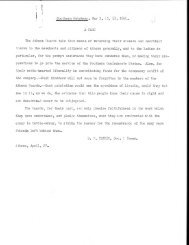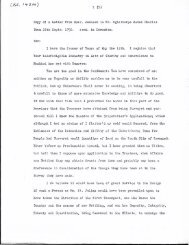THE SHE KING; OR, THE BOOK OF ANCIENT POETRY
THE SHE KING; OR, THE BOOK OF ANCIENT POETRY
THE SHE KING; OR, THE BOOK OF ANCIENT POETRY
Create successful ePaper yourself
Turn your PDF publications into a flip-book with our unique Google optimized e-Paper software.
92 <strong>THE</strong> <strong>BOOK</strong> <strong>OF</strong> POETKY. [PART I. EK IV. i.] <strong>THE</strong> <strong>BOOK</strong> <strong>OF</strong> POETEY.<br />
after he landed on the northern bank of the Ho. Show hecame aware<br />
of the scheme, told Keih-tsze of it, and advised him to escape to another<br />
State. Keih-tsze declining to do this, the other took his boat, personated<br />
him, and was murdered by the ruffians. When Keih-tsze awoke, and<br />
found that Show was gone, he divined his object, took another boat, and<br />
followed him ; crying out, as he drew near the ruffians, in language which<br />
must always recall to a western reader the words of Nisus,<br />
Me, me , 1 adsum quifeci; in me convertite ferrum.<br />
It was too late. The ruffians, " that they might make no mistake," mur<br />
dered him also. The duke tried to conceal the facts, but the people here<br />
intimate their suspicions of the truth.<br />
1 The two youths went into their boats,<br />
Whose shadow on the water floats.<br />
What evil to them came ?<br />
Anxious and wondering, long we muse;<br />
Our hearts are tossed with tossing views.<br />
Some One must be to blame.<br />
2 Into their boats the two youths passed,<br />
And on the stream were carried fast.<br />
What was there to alarm ?<br />
With longing thought we fain would trace,<br />
The secret of thoir ill-starred race.<br />
Did they not come to harm ?<br />
<strong>BOOK</strong> IV.<br />
<strong>THE</strong> ODES <strong>OF</strong> YUNG.<br />
<strong>THE</strong>RE is little to be said here beyond what has been stated on the title<br />
of the last Book. The statistical account of the present dynasty says<br />
that the capital of Yung was in the north-east of the present district of<br />
Keih, department Wei-hwey, Ho-nan.<br />
The Peh chnrv; allusive. PBOTEST OP A WIDOW AGAINST BEING<br />
TJEGED TO MAKBY AGAIN.<br />
The piece, it is said, was made by Kung Keang, the widow of Kung-<br />
peh, son of the marquis He, B.C. 854—813. Her husband dying anearly<br />
tleath, her parents, who must have been the marquis of Ts'e and his wife,<br />
or one of the ladies of his harem, wanted to force upon her a second<br />
marriage ;—against which she here protests. This reference of the piece<br />
to Kung Kcang is not without historical difficulties ; but, no doubt, the<br />
piece was preserved as au example of what the Chinese have always con<br />
sidered a great virtue,—the refusal of a widow to marry again. A<br />
famous writer gives his opinion on the point tlius :—" It may be asked<br />
whether a widow left solitary and poor, «ith none to depend on, may not<br />
marry again, to which I reply that such is the suggestion of subsequent<br />
times through fear of want and starvation. But to die of want is a very<br />
small matter, while the loss of chastity is a very great matter ! " But<br />
why should Chinese moralists mete out different measures for the widow<br />
and the widower ?<br />
1 In the mid Ho that cypress boat floats free,<br />
While friends a second marriage press on me.<br />
I see my hnsband's youthful forehead there,<br />
And on it the twin tufts of falling hair.<br />
Rather than wed again I'll die, I swear !<br />
O mother dear, 0 Heaven supreme, why should<br />
You not allow my vow, and aid my purpose good ?<br />
2 Near to the bank that cypress boat floats free,<br />
While friends a second marriage press on me.<br />
He was my only one, with forehead fair,<br />
And on it the twin tufts of falling hair.








